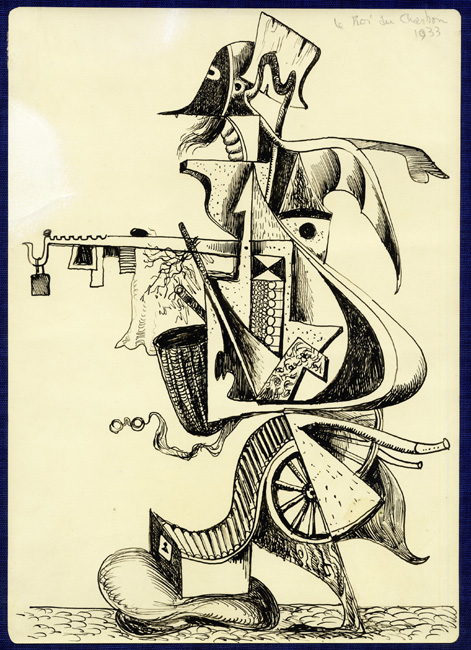Bizarre
- Lepic, Ce qui Restait du Puissant Guillaume de Naillac
- Claeaz, Dancers with Death
- Anonymous American, A Naked Man and Horse
- Klinger, Amor, Tod und Jenseits (Love, Death and the Hereafter)
- Surugue, La Folie pare la Décrépitude
- Legros, La Légende du Bonhomme Misère : La Mort dans le Poirier
- Rops, L’Enlèvement
- Sadeler, Allegory of Opulence, Fornication and Stupidity
- Mohlitz, La Vierge aux Étrons (The Virgin of Turds)
- Legrand, Épaves de Famille (Oddballs of the Family)
- Jacquemart, L’Écurueil (sic)
- Benassit, L’Absinthe!
- de Bry, Punishment of the Mutinous Indians
- Goncourt, Le Singe au Miroir (The Monkey at the Mirror)
- Callot, Les Martyrs du Japon
- Dillon, Les Mendiants (The Beggars)
- Barberis, The Witch
- Budzinski, The Thirsty Giant
- Meryon, Le Ministère de la Marine
- Torre-Bueno, Death’s Arrival
- van Meurs, Animals of America
- Redon, Félinerie
- Chagall, Le Vixe
- Martin, Indécision (Tête de Femme)
- Rops, Le Calvaire
- Rops, Les Frères de la Bonne Trogne
- Gillray, Tentanda via est qua ve quoque possim Tollere humo
- Underwood, Simian Ecstasy
- Veber, Beheaded!
- Strang, Death and the Ploughman’s Wife: Frontispiece
- Corman, The Temptation of Saint Anthony
- Bliss, Gargoyles Spouting
- Castellón, Of Land and Sea
- Eichenberg, Isaiah 11
- Rops, L’Idole (The Idol)
- Master MZ, Aristotle and Phyllis
- Bracquemond, “Hors de mon soleil, canailles!"
- Spare, Nemesis
- Higgens, Forgotten
- Anonymous, Jewish Amulet to Protect Mother and Child
- Daumier, Une Expérience Qui Réussit Trop Bien
- Seligmann, Le Roi du Charbon (King Charcoal)
- Braun, The Release of Force
- Callot, Le Grand Rocher
- Forest, Bâstard Foetus Hérédité, Comte D’Averton Mort-Né
- Jacque, La Souricière
- Veber, “Ah! Qu’il fait chaud"
- Pastelot, Les Sorcières
- Lepic, Le Verger du Roi Louis (The Orchard of King Louis)
- Grandville, Résurrection de la Censure
- Tidemann, The Earth Swallows Up the People of Korah
- Shields, The Descent
- Redon, C’est le diable
- Sadeler, Ita Erit et Aventus Filii Hominis
Le Roi du Charbon (King Charcoal)
Original drawing in pen and black ink, 1933, on yellowish paper backed with another sheet, inscribed with the title and date in pencil upper right; repaired and retouched tears not affecting the image. This is apparently the preliminary drawing for the etching of the same name that appeared in Les Vagabondages Héraldique in 1934 and later (1936) issued in collotype reproduction in Pierre Courthion’s Métiers des Hommes. Like most works of the Swiss-American artist, it doesn’t mean or signify; it just is. While Seligmann’s titles sometimes give a clue as to what was in his mind, his brand of surrealism, which had enormous influence in the United States, was more about the exploration of a unique artistic personality than it was about content per se. The specific title here is minimally informative, but when we know that it comes from a series called “Heraldic Wanderings,” we see that it is a kind of emblem, almost a coat of arms, an artistic tradition that dates far back in time. The basket and the bellows now seem to have a significance, but the drawing still does not have a meaning; it just is. And that is as it should be. Early Seligmann drawings are rarely found. This one has been authenticated by Arlette Seligmann and Timothy Baum.
![]()
